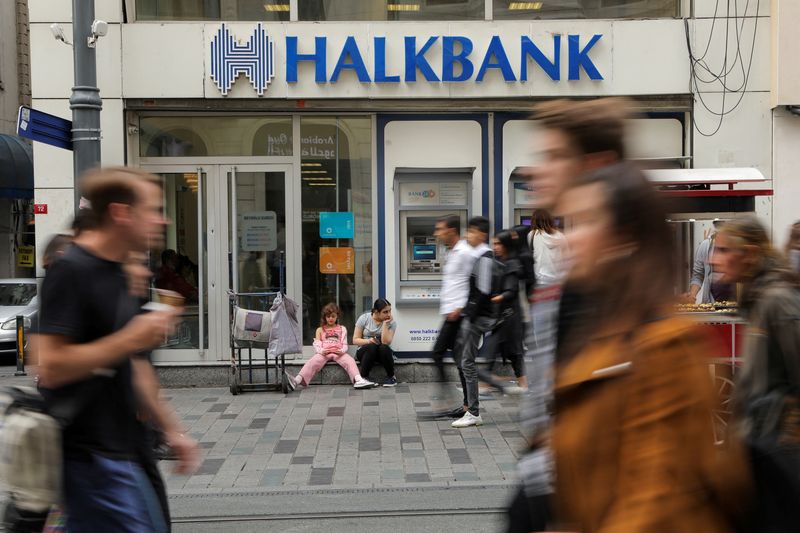US Supreme Court gives Turkey’s Halkbank another chance to avoid charges
2023.04.19 11:14

© Reuters. FILE PHOTO: People walk past by a branch of Halkbank in central Istanbul, Turkey, October 16, 2019. REUTERS/Huseyin Aldemir/File Photo
By Andrew Chung
WASHINGTON (Reuters) – The U.S. Supreme Court on Wednesday bolstered a bid by Turkey’s state-owned lender Halkbank to avoid criminal charges in the United States for allegedly helping Iran evade American economic sanctions.
The justices in a 7-2 decision threw out a lower court’s ruling that had allowed the prosecution to proceed. They ordered the Manhattan-based 2nd U.S. Circuit Court of Appeals to reconsider Halkbank’s effort to dismiss the case.
Halkbank, an entity owned by the Turkish government, was charged in New York in 2019 and has pleaded not guilty to bank fraud, money laundering and conspiracy charges over its alleged use of money servicers and front companies in Iran, Turkey and the United Arab Emirates to evade U.S. sanctions.
Halkbank shares surged 10% on the Istanbul stock exchange after the decision. Shares in Vakifbank, another Turkish state bank, jumped 9.9% and the bourse’s banking index climbed more than 4%.
Halkbank’s case has complicated U.S.-Turkish relations, with Turkish President Tayyip Erdogan calling the American charges against the bank an “unlawful, ugly” step.
The case tested Halkbank’s contention that it is shielded from prosecution because, by virtue of being owned by the Turkish government, it should have the same legal protections as Turkey. Sovereign immunity generally protects countries from facing legal action in another country’s courts.
The Supreme Court rejected the bank’s view that it is protected under a 1976 U.S. law called the Foreign Sovereign Immunities Act (FSIA) that limits the jurisdiction of American courts over lawsuits against foreign countries.
“We disagree because the Act does not provide foreign states and their instrumentalities with immunity from criminal proceedings,” wrote conservative Justice Brett Kavanaugh, who authored the ruling for the court’s majority.
The majority found that the 2nd Circuit did not fully consider whether the bank has immunity under “common law” principles.
Justice Neil Gorsuch, in a dissent joined by fellow conservative Justice Samuel Alito, said the Foreign Sovereign Immunities Act does apply but that the bank’s prosecution would still be allowed to proceed under the law’s exceptions for commercial activity in or affecting the United States.
Wednesday’s decision, Gorsuch wrote, “overcomplicates the law for no good reason.”
President Joe Biden’s administration has said the FSIA does not apply to criminal prosecutions and, even if it did, Halkbank’s actions fell under the law’s exception to sovereign immunity for misconduct involving commercial activities.
The U.S. government has argued that the case does not involve the prosecution of a sovereign government, and that it has been pursuing criminal matters against foreign government-owned companies – if not foreign states themselves – for at least 70 years.
A Justice Department lawyer told the court in January that ruling for Halkbank could allow any foreign state-owned enterprise to “become a clearinghouse for any federal crime, including interfering in our elections, stealing our nuclear secrets, or something like here, evading our sanctions and funneling billions of dollars to an embargoed nation.”
U.S. prosecutors accused Halkbank of converting oil revenue into gold and then cash to benefit Iranian interests, and documenting fake food shipments to justify transfers of oil proceeds. They also said Halkbank helped Iran secretly transfer $20 billion of restricted funds, with at least $1 billion laundered through the U.S. financial system.
The Manhattan-based 2nd U.S. Circuit Court of Appeals in 2021 ruled against Halkbank, concluding that even if the FSIA law shielded the bank, the conduct for which it was charged fell under the commercial-activity exception.








